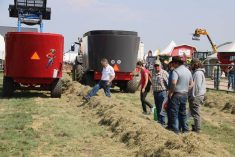Farmers in Manitoba’s Red River Valley are hitting one obstacle after another in their efforts to move grain out of area before what could be Manitoba’s worst flood this century slams the region later this month.
A backlog of grain shipments to the West Coast, a record April blizzard that paralyzed the region and a bumper crop harvested by southern Manitoba farmers last fall stymied a special program set up by the Canadian Wheat Board to move grain out of the valley, but board officials say every little bit will help.
Read Also
Man charged after assault at grain elevator
RCMP have charged a 51-year-old Weyburn man after an altercation at the Pioneer elevator at Corinne, Sask. July 22.
“Any grain that moves out of Manitoba even now is just another tonne that would be out of the way of flood waters depending on how serious it is going to be,” said wheat board spokesperson Deanna Allen.
Last year the program saw 100,000 tonnes of grain moved from the area before flood waters began to rise.
This year, 160,000 tonnes have been moved to date but it might not be enough.
“If we get the mother of all floods there will be trouble,” said Burt Dupasquier, the wheat board area representative.
Three separate initiatives were included in the program, which ran from February to March.
- 400 rail cars a week moved 120,000 tonnes of grain from flood prone areas of southern Man.
- About five grain shipments of 4,000 tonnes each were trucked from the region to Minneapolis and other U.S. elevator points to meet rail transports en route to customers in the Gulf of Mexico.
- Burlington Northern, a U.S. railway, carried 25,000 tonnes of southern Manitoba grain destined for overseas via Portland, Oregon.
Deliver early
The board also allowed farmers to deliver series A and B contracts to elevators before the contracts were called, in order to move grain stored in low-lying areas, Allen said.
The threat of damage escalated when record blizzards paralyzed farm operations and hurled 57 centimetres of snow on the already flood-prone region.
“Prior to the blizzard we were feeling pretty comfortable that any farmer that was in trouble knew to contact us, was in the process of contacting us or had already moved his grain,” Allen said.
“Now we’re dealing with it on a case by case basis.”
Dupasquier said the board knew the situation would be worse this year. He organized meetings in Letellier, Morris and St. Jean to warn farmers all grain could not be moved under the program and advised moving it to higher ground.
“Farmers are still somewhat concerned but they’re waiting for the latest flood forecasts,” he said.
Railway companies also said they would monitor flooding in the region.
















